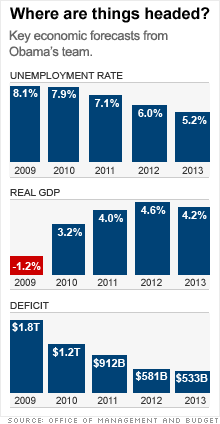Obama's success: It's all about 2010
The first 100 days is a premature marker to fully assess the president. But Obama's final buzzer on the economy may come at the end of his first 500.

NEW YORK (CNNMoney.com) -- President Obama has said if the economy doesn't turn around on his watch, voters won't give him a second term.
"If I don't have this done in three years, then there's going to be a one-term proposition," he said in an NBC interview in February.
Policy experts agree Obama's presidency will be rated on the speed and depth of the economic recovery. But they think he may only have until mid-2010 to get the economy moving in the right direction before Americans start blaming him for what ails them.
"If we get back to an upward economy in 2010, it'll be good. But if we're in it [longer] ... people's opinions will be formed. That's as much patience as Americans will have," said Gary Clyde Hufbauer, Reginald Jones senior fellow of the Peterson Institute.
And voters could take it out on Democrats in the November 2010 midterm congressional elections.
"Republicans could cut into Democratic majorities," said American University Professor Allan Lichtman, a political historian and presidential election expert.
What specifically needs to happen by mid-2010? There needs to be clear evidence of a recovery, with unemployment back down around 8%, production up, foreclosures on the decline, and stocks higher. "Take your headlines today and flip the verbs," Hufbauer said.
The economy has worsened since Obama took office. Indeed, he has said many times that things would get worse before they get better.
Economists are in two camps: those who are cautiously optimistic that the economy is poised for near-term recovery, and those who may concede the economy could be touching bottom but aren't convinced a bounce-back will occur soon.
Lakshman Achuthan, managing director of the Economic Cycle Research Institute, is in the optimists' camp for two reasons.
For one thing, despite a very sour economy, Obama has helped to boost confidence, which is an intangible necessity for recovery, Achuthan said. Second, the leading indicators he analyzes suggest the country may be at or very near a bottom -- and that could mean an economic recovery could begin over the next four months, he said.
Brian Bethune, chief U.S. financial economist of Global Insight, said he is also seeing data that suggest a trough may be near, but he is less certain a recovery is in the offing.
"You get a sense there's a breadth of things improving although not a depth," Bethune. "There's not enough to say there's a definite trough or beyond that a recovery."
While the pace of economic recovery may make or break Obama's chances for another term, his presidency will also be assessed on his ability to foster reform in terms of health care, Medicare, Social Security and energy.
Particularly when it comes to entitlement programs, the onus on Obama is "not to solve them but to turn the corner. That's all landmark stuff," Hufbauer said.
Administration officials and others make the case that the country's long-term debt problem will only be resolved once health care costs are brought under control. And the president wants to earmark $634 billion as a down payment on the cost of health care reform. He's also calling for that fund to be deficit neutral, meaning lawmakers will have to come up with ways to pay for it.
Budget hawks applaud his deficit-neutral stance on issues like health care reform and his vow to reduce the annual deficit by 2013. But they're not happy with the fact that his budget would start running it up again by 2019, under even optimistic economic forecasts.
"He's been saying a lot of the right things," said Marc Goldwein, policy director at the Committee for a Responsible Federal Budget. "[But] the numbers in his 2010 budget assume the economy recovers very quickly and the deficits in the out years are still very bad."
Last year, the public debt -- the sum of all annual deficits to date plus interest -- was 41% of GDP. Under Obama's budget it would jump to 67% by 2019, according to administration estimates, which may be revised this summer. The Congressional Budget Office, using different assumptions than the White House, estimates the president's budget will push public debt to 82%.
Those levels are considered unsustainable by some, but there is no hard-and-fast limit that defines sustainable.
Generally speaking, the more debt the government issues over time, the more likely it is to crowd out private investment in corporate bonds, slowing economic growth. And there's a greater the risk that the interest the government owes on its debt would grow at a faster rate than the economy.
"If we're permanently spending significantly more than we're raising that should be cause for concern," Goldwein said.
Of course, Obama is betting his presidency that running up debt to reform energy and health care now may be less expensive in the long run than not reforming them. ![]()


